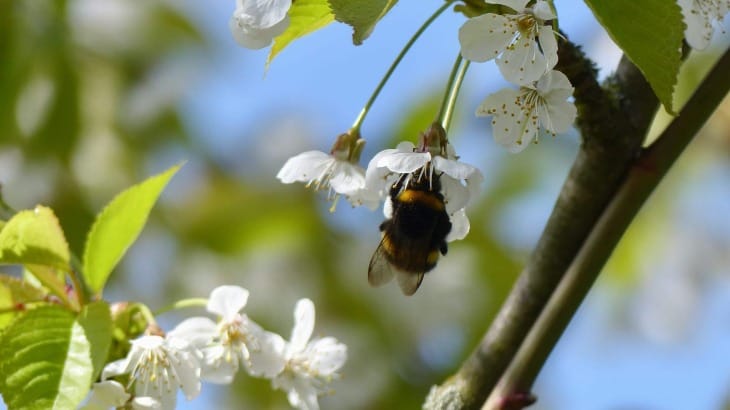Biodiversity matters - popcawn April 2024

Save the bees! Save the whales! Save yourselves!
We don’t often hear those phrases in quick succession – it’s difficult to see how the loss of sea creatures or insects can affect our lives. But whether we see it or not, we humans are animals and very much part of nature, and therefore highly vulnerable to depletion of the natural world. Our ecosystems are complex and inter-dependent: loss of one species will have knock-on effects throughout the ecosystem. Humanity has evolved within, and remains dependent on, rich and diverse ecosystems. Indeed the term ‘ecosystem services’ has been adopted to describe the benefits to humans that are derived from nature. One much publicised example is pollination of food crops. It’s estimated that crop production would fall by around 10% in low to middle income countries without pollinators, and many of the crops that are dependent on pollinators are cash crops for developing countries, so that’s loss of vital income.1 For anyone who doesn’t care, because high income countries would be less affected, a reminder that ‘A world without pollinators would mean a world without chocolate’ might focus their attention. Other ecosystem services include healthy soils and seas for food provision and carbon sequestration, and forests to provide a plethora of natural resources, not least the oxygen we breathe. A healthy natural world also impacts on our culture and mental health – something we realised during the COVID-19 pandemic.
The UK is one of the most nature-depleted countries in the world – in the bottom 10% globally, having lost around half of its natural biodiversity according to a 2020 report.2 The State of Nature report released in November 2023 revealed that we’ve lost around 19% of the species studied since 1970 (by when undoubtedly we would have experienced much loss already), with almost 1 in 6 and 1 in 8 species at risk of extinction in Great Britain and Northern Ireland, respectively.3
The UK government has a legal obligation to restore nature under the Environment Act 2021, signed into law to ensure environmental protections were not lost after leaving the EU.4 Many members of CA-WN are involved with the local parish and town councils, so may have heard about the obligation to adopt a biodiversity plan. We’ll be providing guidance on this in the coming weeks – watch this space! In the meantime, you can learn more about preserving our natural world through the articles under ‘Further reading’ below.
References
1. Our World in Data. How much of the world’s food production is dependent on pollinators? Available at: https://ourworldindata.org/pollinator-dependence. Accessed 29 March 2024
2. Natural History Museum. UK has 'led the world' in destroying the natural environment. Available at: https://www.nhm.ac.uk/discover/news/2020/september/uk-has-led-the-world-in-destroying-the-natural-environment.html. Accessed 29 Match 2024
3. Burns, F., Mordue, S., al Fulaij N. et al. 2023. State of Nature 2023, the State of Nature partnership. Available at: www.stateofnature.org.uk. Accessed 31 October 2023
4. Friends of the Earth. 5 things you need to know about the new Environment Act. Available at: https://friendsoftheearth.uk/system-change/5-things-you-need-know-about-new-environment-act. Accessed 29 March 2024
Further reading
University of Reading. Five ways to protect and restore biodiversity in the UK. Available at: https://research.reading.ac.uk/research-blog/five-ways-to-protect-and-restore-biodiversity-in-the-uk/
The Royal Society. What can we do to protect biodiversity. Available at: https://royalsociety.org/news-resources/projects/biodiversity/what-can-we-do-to-protect-biodiversity/
WWF. You can help save biodiversity. Available at: https://wwf.panda.org/discover/our_focus/biodiversity/what_you_can_do/
